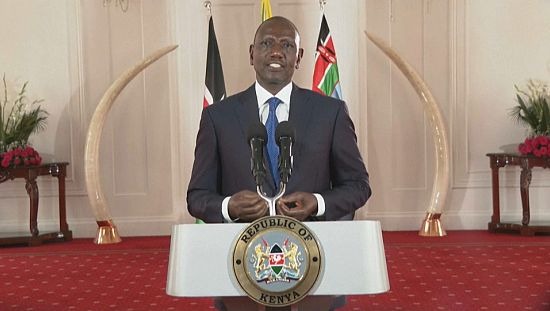Kenya’s president on Tuesday welcomed the U.N. Security Council’s resolution to send a Kenya-led multinational armed force to Haiti to help combat violent gangs and pledged that it will “not fail the people of Haiti.”
President William Ruto’s remarks came hours after Monday’s vote at the United Nations, marking the first time in almost 20 years that a force would be deployed to the troubled Caribbean nation.
Ruto said the Kenya-led force “will provide a different footprint in the history of international interventions in Haiti.”
“We shall succeed in Haiti,” he said. “We must not fail the people of Haiti.”
The resolution, drafted by the United States and Ecuador, authorizes the force to deploy for one year, with a review after nine months. The non-U.N. mission would be funded by voluntary contributions, with the U.S. pledging up to $200 million.
It wasn’t immediately clear how big the force would be. Kenya’s government had earlier proposed 1,000 police officers. Ruto did not specify when they would be deployed, but Foreign Minister Alfred Mutua on Monday night said it would happen “within a short time.”
Earlier, Mutua had said Kenya was waiting for the vote at the Security Council but that logistics planning was underway and that key Kenyan officers were taking French lessons to bridge the language barrier between Kenyans and Haitians.
Kenya’s Inspector General of Police Japhet Koome on Friday expressed optimism that the peacekeeping mission would be a success. “Yes, we are going to Haiti, we shall lead that mission,” he said. “We have never failed.”
However, Kenyan police have long been accused by watchdogs of corruption, use of deadly force, torture and other abuses.
An ex-police officer considered by many to be Haiti’s most powerful gang leader — Jimmy Chérizier, known as “Barbecue” — has warned that he would fight any international force deployed to the country if it committed any abuses.
Kenya offered to lead the Haiti mission, citing its history in global peacekeeping missions, as well as ties between Africa and Haiti, where most of the population is of African descent.
The vote at the U.N. Security Council came nearly a year after Haiti’s government requested help to quell a surge in gang violence and restore security so the country can hold long-delayed elections.
Haiti’s National Police has struggled in its fight against gangs with only about 10,000 active officers in a country of more than 11 million people.









